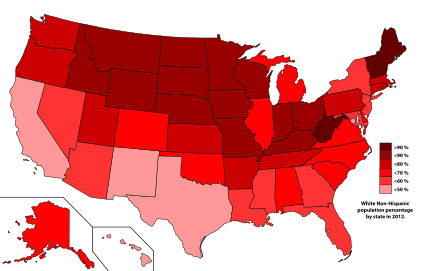Anglo-Americans
| Look up anglo-americans in Wiktionary, the free dictionary. |
.svg.png) | |
| Total population | |
|---|---|
|
(215.6 million (196.8 million Non-Hispanic whites[1] and 17.8 million English Canadians)[2]) | |
| Regions with significant populations | |
| Throughout the United States and Canada | |
| Languages | |
| English (American, Canadian) |
Anglo-Americans or Anglos are people who are inhabitants of Anglo-America and are referred to as English American and/or an English Canadian. It typically refers to an English-speaking American in distinction to Spanish speakers in the Southwestern states and in Mexico;[3][4] German speakers (Amish) in North Dakota, Ohio, and Pennsylvania;[5] and French speakers in Canada,[6] New England and Louisiana.[7] This usage originated in the discussion of the history of English-speaking people of the United States and the Spanish-speaking people residing in the western United States during the Mexican–American War.
Definition
While the term Anglo-American used in regard to ethnicity is frequently used only to refer to people of Caucasian ancestry, it (along with terms like Anglo, Anglic, Anglophone, and Anglophonic) can also be used to denote all English-speaking people and their descendants in the New World, regardless of prior ethnic background, much like Hispanic refers to people of any race. Therefore, a person, for example, of Chinese descent who adopts the American or Canadian culture would have English-speaking "Anglo-American", "Anglic", "Anglophone", "Anglo", or "Anglophonic" children (in contrast to Spanish-speaking Chinese descent people living in Hispanic America, who would be "Hispanic"). Thus, Anglo-American, Anglic-American, Anglophone-American, Anglo, or Anglophonic-American can refer to all those whose families who, regardless of race, have become mainstream English-speaking people in the United States, English Canada, English-speaking areas of the Caribbean, Belize, and Guyana, including those of African descent.
Culture

The term implies a relationship between the United States and the United Kingdom (specifically England), or the two countries' shared language, English, and/or cultural heritage. In this context the term may refer to an English American, a person from the United States whose ancestry originates wholly or partly in England, a person from the United States who speaks English as their first language (see American English, a collective term referring to those countries that have similar legal systems based on common law, relations between the United Kingdom and United States, or Anglo-American Cataloguing Rules, a national cataloging code.
The term is also used, less frequently, to denote a connection between English people (or the English language) and the Western Hemisphere as a whole. In this context the term can mean a person from the Americas whose ancestry originates wholly or partly in England (see British diaspora),nperson from the Americas who is a White American and speaks English as their first language, a person from the Americas who speaks English as their first language (see English-speaking world and Languages of the Americas), or person from Anglo-America.
Adjective
The adjective Anglo-American is used in the following ways:
- to denote the cultural sphere shared by the United Kingdom, the United States and English Canada. For example, "Anglo-American culture is different from French culture." Political leaders including Winston Churchill, Franklin D. Roosevelt and Ronald Reagan have used the term to discuss the "Special Relationship" between Britain and America.
- to describe relations between Britain and America. For example, "Anglo-American relations became more relaxed after the War of 1812."
In business:
- Anglo American plc, a British multinational mining company
- Anglo-American Publishing, a Canadian comic book publishing company active during the 1940s
References
- ↑ "United States - Selected Population Profile in the United States (White alone, not Hispanic or Latino)". 2009 American Community Survey 1-Year Estimates. U.S. Census Bureau. Retrieved 2010-10-27.
- ↑ "Language Highlight Tables, 2006 Census". 2.statcan.ca. 2009-04-07. Retrieved 2011-01-28.
- ↑ Mish, Frederic C., Editor in Chief Webster's Tenth New Collegiate Dictionary Springfield, Massachusetts, U.S.A.:1994--Merriam-Webster See original definition (definition #1) of Anglo in English: It is defined as a synonym for Anglo-American--Page 86
- ↑ "Anglo - Definitions from Dictionary.com; American Heritage Dictionary". Lexico Publishing Group, LLC. Archived from the original on 15 March 2008. Retrieved 2008-03-29.
Usage Note: In contemporary American usage, Anglo is used primarily in direct contrast to Hispanic or Latino. In this context it is not limited to persons of English or even British descent, but can be generally applied to any non-Hispanic white person, making mother tongue (in this case English) the primary factor. Thus in parts of the United States such as the Southwest United States with large Hispanic populations, an American of Polish, Irish, or German heritage might be termed an Anglo just as readily as a person of English descent. However, in parts of the country where the Hispanic community is smaller or nonexistent, or in areas where ethnic distinctions among European groups remain strong, Anglo has little currency as a catch-all term for non-Hispanic whites. Anglo is also used in non-Hispanic contexts. In Canada, where its usage dates at least to 1800, the distinction is between persons of English and French descent. And in American historical contexts Anglo is apt to be used more strictly to refer to persons of English heritage, as in this passage describing the politics of nation-building in pre-Revolutionary America: "The 'unity' of the American people derived ... from the ability and willingness of an Anglo elite to stamp its image on other peoples coming to this country" (Benjamin Schwarz).
- ↑ American Experience: The Amish
- ↑ "Quick Facts about Canada's Francophonie". ocol-clo.gc.ca. 2013-03-21. Retrieved 2 October 2013.
- ↑ http://www.leagle.com/decision/1980709494FSupp215_1669/ROACH%20v.%20DRESSER%20IND.%20VALVE%20&%20INSTRUMENT%20DIVISION